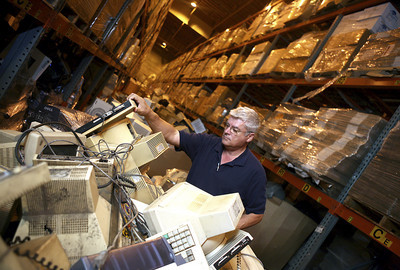CLEAN SWEEP
Recycling is as easy as red (aluminum, tin cans, plastic bottles), white (newspapers, magazines) and blue (glass bottles). But what about black (fax machines), brown (motor oil), purple (cell phones) and gray (televisions)?
Alan Gaddy, an area engineer for Nevada Operations of Republic Services, knows all the colors, what they mean and where they go.
"There is so much that can be recycled and it doesn't take that much effort to participate," Gaddy said. "Our recycling center, where customers can bring in used oil, batteries, paints, televisions and even washers and dryers, is at Gowan (Road) and Cheyenne (Avenue) and open Tuesday through Saturday from 8 a.m.-4 p.m. Recycling is simply an awareness issue."
Gaddy, a certified environmental manager, said that awareness is an end result of understanding utilization of resources.
"Utilization of resources isn't an issue here because we have an unlimited amount of land," he said. "But Europe has limited land and cannot have landfills so they manage waste differently. Same with the East Coast. They're running out of land so recycling is of greater importance there. In fact, New York state strictly enforces recycling ordinances, including one that if aluminum cans are found in your trash, you're fined $25."
Items such as computers, monitors, printers, telephones, cell phones and fax machines can be recycled at The Blind Center of Nevada, the largest electronic recycler in the state. And good for them because The National Safety Council estimates 250 million computers will be obsolete by 2009 as demand for consumer electronics grows, along with the fact that Americans are discarding around 100 million cell phones per year.
"Depending on the age and condition of what we receive, we either refurbish and resell the item, or consolidate with other unusable equipment and sell to companies that extract for plastic, circuit boards, metal and wire," said Bob Waldorf, vice president of operations. "We accept items at 1001 N. Bruce St. from 8 a.m.- 3 p.m., Monday through Friday. And all the money we get from this enables us to provide employment for those who are visually impaired or blind."
Waldorf said the center also offers a computer data erasure service that sanitizes hard drives.
"There are too many computers sitting out there with personal information," he said. "For eight dollars, our electronic override system removes all data from your computer. We even give you a certificate of destruction with serial number so you have a record for your protection."
The center does not accept televisions but Republic does and Gaddy is expecting thousands in the coming months.
"Congress has mandated that Feb. 17, 2009, be the last day for full-power television stations to broadcast in analog," Gaddy said. "So we're going to see a lot of televisions with antennas as consumers upgrade to digital televisions. We're asking customers to bring us their TVs so we can properly dispose of them."
Gaddy said customers should be more aware of what they throw in the trash, not only because of the environment but for the safety of the men who regularly pick up their garbage.
"For some reason, people throw away plastic jugs of swimming pool acid," he said. "The jug usually ends up under some papers and when our men put it in the back of the truck and compress the garbage, the jug explodes spewing the acid."
Gaddy said another regular occurrence is customers who place warm barbecue coals in the trash.
"Believe it or not, this happens monthly," he said. "The coals are not completely extinguished when people put them in their trash and the coals quietly smolder. When our employees empty the trash into the truck, that fluff of air is all that's needed to ignite those coals. We have about one truck fire a month because of this."
Gaddy said the United States Environmental Protection Agency realizes people are lazy and won't make the effort to recycle. So specifications and regulations, established in 1993, mandate that companies operating landfills, such as Republic's Apex Regional Landfill, the largest in Nevada, protect the environment.
"We have a specially designed synthetic liner underneath the entire landfill to prevent environmental contamination," he said. "But eventually, consumers are going to have to develop a greater interest within all aspects of recycling."






















